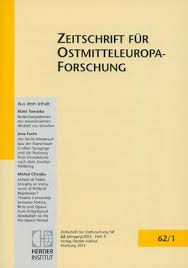Der Kongress für kulturelle Freiheit und die polnische Exilzeitschrift Kultura
The Congress for Cultural Freedom and the Polish Exile Journal Kultura
Author(s): Bernard WiadernySubject(s): Media studies, Political history, Post-War period (1950 - 1989), History of Communism
Published by: Verlag Herder-Institut
Keywords: The Congress for Cultural Freedom; Polish Exile; Journal Kultura;
Summary/Abstract: This study deals with the collaboration of the Congress for Cultural Freedom (CCF) with the Polish Exile Journal Kultura. This approach has brought certain features of the two circles into sharper focus than had previously been the case in historical research. It became apparent that, from the outset, the CCF organisation had no intention of becoming involved in Soviet-controlled Eastern Europe. This basic position also applied the Ukraine question and reflected the line taken by US policy towards the Soviet Union at that time. At its founding meeting in West Berlin in 1950, the Congress, under the influence of certain of its members, prominently James Burnham and Arthur Koestler, as well as the two representatives of the Kultura (Józef Czapski and Jerzy Giedroyc), deviated from this position. As, however, the CCF was completely under CIA control, this led inevitably to Burnham, Koestler and the representatives of Kultura having to leave the organisation. This occurred between 1951 and 1953. The following conclusions may be drawn with regard to the Kultura circle: it was Burnham who convinced Giedroyc and Czapski of the need for an understanding with the members of other East Central European freedom movements. The aim of these efforts was to plan for a stable East Central Europe, free from national conflicts, for the time following the demise of Communism. It was this impulse that spurred the Kultura circle’s very first statement of principle on this subject. Thus the intellectual reflection on an ideal future for East Central Europe, so characteristic of this journal in the years to come, was born in June 1950. In their efforts to include East Central Europe in the work of the Congress the representatives of the journal employed cultural arguments: they drew attention to the cultural unity of the entire Continent. This was an argument, which, in the setting of the Cold War, had a strongly political and offensive character, Burnham arranged for Kultura to receive financial support from the Office of Policy Coordination, an organisation for which he also worked. This fact has hitherto not appeared in academic literature. It is highly desirable that academic research conduct an investigation of this episode and seek an answer to the question of whether this financial support had any influence on the content of the journal. Through its cooperation with Kultura, the CCF achieved a greater presence for East Central European authors and topics in its periodicals, such as Preuves and Der Monat, and through them, an awareness of these questions among the public in the West. Kultura itself provided the opportunity to make contact with intellectuals living in the West.
Journal: Zeitschrift für Ostmitteleuropa-Forschung
- Issue Year: 60/2011
- Issue No: 1
- Page Range: 50-78
- Page Count: 29
- Language: German

